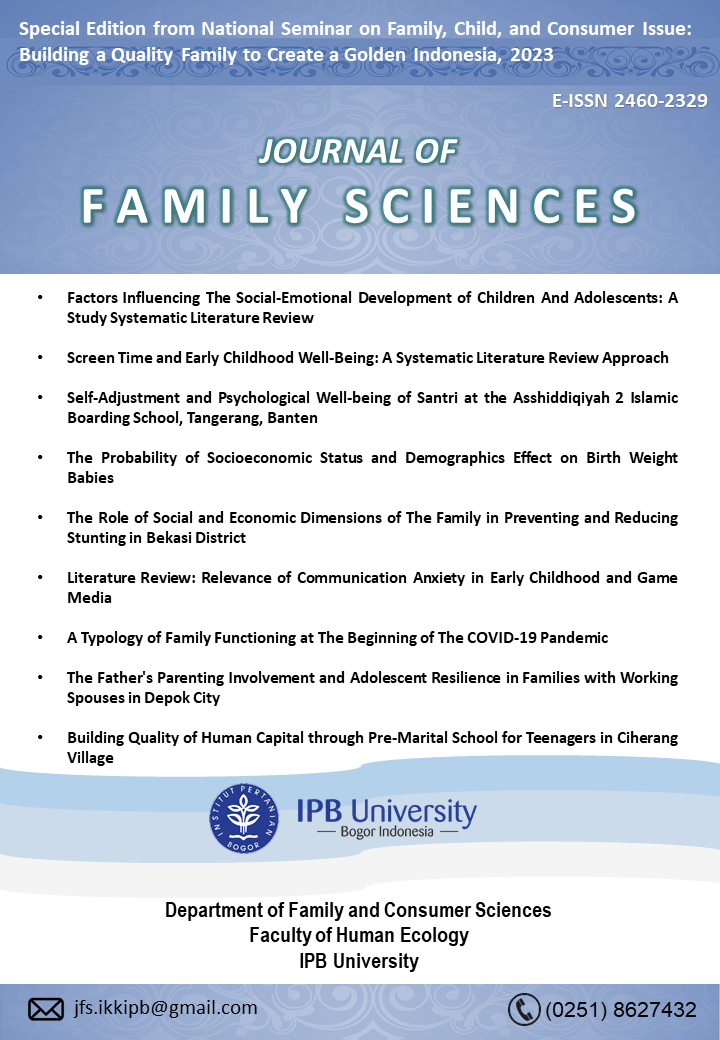The Father's Parenting Involvement and Adolescent Resilience in Families with Working Spouses in Depok City
Abstract
Optimal parenting is an important key to building adolescent resilience. Societal culture tends to exclude fathers from parenting. At the same time, the father's involvement in parenting has a positive effect on adolescent development. This study aims to analyze the father's parenting involvement and adolescents' resilience in families where both husband and wife work. This study used a descriptive qualitative phenomenological method with a purposive sampling technique. There were 15 respondents in this study with the criteria of adolescent children with working fathers and mothers. This research was conducted in Depok City in June 2023. Data collection techniques using in-depth interviews with data analysis, reduction, presentation, and conclusion drawing. The results showed that adolescents whose fathers are directly involved in parenting, care, and pay attention to adolescents and do not conflict with adolescents tend to have high resilience, indicated by being adaptable, not easily angry, and having adequate social support from family, friends, and teachers at school. This study is expected to provide input for relevant institutions and agencies to start campaigning for the importance of fathers' involvement in parenting in order to increase adolescent resilience.
Downloads
References
Adamson, K., & Johnson, S. K. (2013). An updated and expanded meta-analysis of nonresident fathering and child well-being. Journal of Family Psychology, 27(4), 589-599. https://doi.org/10.1037/a0033786
Abdullah, S. M. (2009). Paternal involvement in parenting. Insight. 7(1): 32-57.
Ager, A. (2013). Annual research review: resilience and child well-being public policy implications. Journal of Child Psychology and Psychiatry, 54, 488-500. https://doi.org/10.1111/jcpp.12030
van den Berg, H. S., George, A. A., Plessis, E. D. D., Botha, A., Basson, N., De Villiers, M., & Makola, S. (2013). The pivotal role of social support in the well-being of adolescents. Well-being research in South Africa, 315-339. https://doi.org/10.1007/978-94-007-6368-5_15
Choon, L. J., Hasbulla, M., Ahmad, S., & Ling, W. S. (2013). Parental attachment, peer attachment, and delinquency among adolescents in Selangor, Malaysia. Asian Social Science, 9(15), 214-219. https://doi.org/10.5539/ass.v9n15p214
Dagun, S. M. (2002). Family Psychology. Jakarta(ID): Rineka Cipta.
Dick, G. L. (2004). The fatherhood scale. Research on Social Work Practice, 14(2), 80-92. https://doi.org/10.1177/1049731503257863
Dawson, M. (2013). Resilience: The role of optimism, perceived parental autonomy support and perceived social support. Journal of Education and Training Studies, 1(2), 38-46. https://doi.org/10.11114/jets.v1i2.137
Gervan, S., Granic, I., Solomon, T., Blokland, K., & Ferguson, B. (2012). Paternal involvement in Multisystemic Therapy: effects on adolescent outcomes and maternal depression. Journal of Adolescence, 35(3), 743-51. https://doi.org/10.1016/j.adolescence.2011.10.009
Hurlock. 2002). Developmental Psychology: an Approach Across The Life Span. 5th ed. Jakarta(ID): Erlangga.
Luthar, S., Cicchetti, D. (2000). The construct of resilience: a critical evaluation and guidelines for future work. Child Development, 71(3), 543- 562 https://doi.org/10.1111/1467-8624.00164
Maesaroh, S., Sunarti, E., & Muflikhati, I. (2019). Threats, protective factors and resilience of adolescents in Bogor city. Jur. Ilm. Kel. & Kons, 12(1), 63- 74. https://doi.org/10.24156/jikk.2019.12.1.63
Muniriyanto, Suharman. (2014). Self-concept, Intensity, Parent-Child Communication and the Tendency of Premarital Sex Behavior. Indonesian Journal of Psychology, 1(2).
Milevsky, A., Schlechter, M., Netter, S., & Keehn, D. (2007). Maternal and paternal parenting styles in adolescents: Associations with self-esteem, depression, and life- satisfaction. Journal of Child and Family Studies, 16(1), 39-47. https://doi.org/10.1007/s10826-006-9066-5
Malmberg, L., & Flouri, E. (2011). The comparison and interdependence of maternal and paternal influences on young children's behavior and resilience. Journal of Clinical Child and Adolescent Psychology, 40(3), 434-444. https://doi.org/10.1080/15374416.2011.563469
Riany, Y. E., Cuskelly, M., & Meredith, P. (2017). Understanding the influence of traditional cultural values on Indonesian parenting. Marriage & Family Review, 53(3), 207-226. https://doi.org/10.1080/01494929.2016.1157561
Ruswahyuningsih, & Tina Afiatin. (2015). Resiliensi pada remaja Jawa. Gadjah Mada Journal of Psychology, 1(2), 96-105.
Rizkillah, R., Sunarti, E., & Herawati, T. (2015). Marital quality and parenting environment in families with working husbands and wives. Journal of Family & Consumer Sciences, 8(1), 10-19. https://doi.org/10.24156/jikk.2015.8.1.10
Sarkadi, A., Kristiansson, R., Oberklaid, F., & Bremberg, S. (2008). Fathers' involvement and children's developmental outcomes: a systematic review of longitudinal studies. Acta paediatrica, 97(2), 153-158. https://doi.org/10.1111/j.1651-2227.2007.00572.x
Steinberg, L. (2003). Adolescence. New York(US): McGraw-Hill, Inc.
Sunarti, E. (2013). Family Resilience (Explanation of Family Kit Materials). Bogor (ID): IPB Pr.
Sunarti, E., Rochimah, Islamia. (2015). Assessment of Child Resilience Factors. Bogor(ID): IPB.
Sunarti, E., Islamia, Rochimah, & Ulfa. (2017). The influence of ecological factors on adolescent resilience. Jur. Ilm. Kel. & Kons, 10(2), 107-119. https://doi.org/10.24156/jikk.2017.10.2.107
Torres, N., Veríssimo, M., Monteiro, L., Ribeiro, O., & Santos, A. J. (2014). Domains of father involvement, social competence and problem behavior in preschool children. Journal of Family Studies, 20(3), 188-203. https://doi.org/10.1080/13229400.2014.11082006
Wijanarko, J., & Setiawati, E. (2016). Parenting in the Digital Age: Good Dad, Good Mom. Jakarta (ID): National Library of Indonesia.
Zupancic, M., & Kavic, T. (2005). Child personality measures as contemporaneous and longitudinal predictors of social behavior in pre-school. Horizons of Psychology, 14(1), 17-33.
Zolkoski, S., & Bullock. (2012). Resilience in children and youth: a review. Children and Youth Services Review, 34, 2295-2303. https://doi.org/10.1016/j.childyouth.2012.08.009
Authors who publish with this journal agree to the following terms:
- Authors retain copyright and grant the journal right of first publication with the work simultaneously licensed under

This work is licensed under a Creative Commons Attribution 4.0 International License. that allows others to share the work with an acknowledgement of the work's authorship and initial publication in this journal. - Authors are able to enter into separate, additional contractual arrangements for the non-exclusive distribution of the journal's published version of the work (e.g., post it to an institutional repository or publish it in a book), with an acknowledgement of its initial publication in this journal.
- Authors are permitted and encouraged to post their work online (e.g., in institutional repositories or on their website) prior to and during the submission process, as it can lead to productive exchanges, as well as earlier and greater citation of published work (See The Effect of Open Access).



_001.png)



